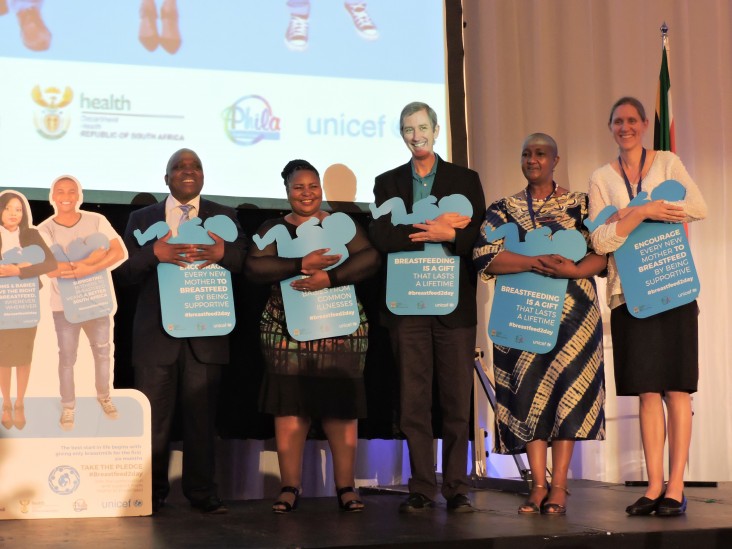Speeches Shim

USAID/Southern Africa Acting Mission Director, Rebecca Krzywda
Deputy Minister of Health, Joe Phahla;
Mayor Mzwandile Masina;
Friends and colleagues from the donor and international communities;
ladies and gentlemen,
Good afternoon.
I am so pleased to be here today representing the U.S. Agency for International Development, and delighted to have an opportunity to emphasize the priority we place on this important topic.
Globally, USAID considers that breastfeeding is one of the most valuable gifts a mother and society can give her child.
USAID’s support for breastfeeding is longstanding, going back to the 1970’s, when USAID raised concern over a decline in breastfeeding. We are proud that our “Breastfeeding for Child Survival Strategy” was launched all the way back in 1990, establishing breastfeeding as a critical component of our programs.
Exclusive breastfeeding is a cornerstone of USAID's work on ending preventable maternal and child deaths, and in support of our long-term strategy for improved child health and nutrition.
Among USAID’s high impact actions to improve childhood nutrition is our commitment to providing support to good maternal nutrition, and optimal breastfeeding, including immediate breastfeeding on delivery and exclusive breastfeeding for six months.
As we and other health professionals around the world say, Breast is Best! But we also need to recognize that breastfeeding is hard work.
As the mother of triplets, I know firsthand how hard breastfeeding can be. I know all the moms here today will agree with me… between hormones regulating and sleep deprivation, it is a challenge for almost every new mom… but it is worth the effort.
A mother’s ability to breastfeed successfully can be greatly improved through active support from their families, friends, communities, health care leaders, employers and policymakers.
Given the importance of breastfeeding for the health and well-being of mothers and children, it is critical that we take action to make exclusive breastfeeding possible for every mother, no matter where they live, whether or not they work, and whether or not they have HIV.
USAID supports maternal and child health programs around the world to make this a reality. Midwives and community health workers are trained to support mothers and their families to enable exclusive breastfeeding.
Our programs help local health systems to support rooming-in to keep mothers and newborns together to facilitate feeding on demand and early bonding.
In order to foster sharing of technical expertise, we recently hosted – in August 2016 – a USAID Breastfeeding Symposium in Washington, D.C.
Here in South Africa, USAID has supported the work of the Nutrition Assessment, Counseling and Support project under FHI360, with funding through the President’s Emergency Plan for AIDS Relief, better known throughout the continent as PEPFAR.
This project was designed to improve South Africa’s exclusive breastfeeding rates, which as we have heard are very low, at just over seven percent. This sub-optimal start for infants contributes to South Africa’s high rates of stunting and obesity.
FHI360’s Nutrition Assessment, Counseling and Support program has provided support to primary health care sites and community outreach programs to overcome challenges to breastfeeding, especially in South Africa’s KwaZulu Natal Province, where HIV rates among pregnant women exceed 40 percent in some areas.
This activity has also supported our Department of Health and social sector colleagues in critical policy developments such as South Africa’s Nutrition Road Map for 2013 to 2017.
Another very successful USAID and PEPFAR-supported organization, “mothers2mothers”, provides support and education to pregnant women, ensuring that they are knowledgeable about their pregnancies and are empowered to make healthy choices that result in healthy moms and babies − particularly when the moms are HIV-positive.
Encouraging mothers to exclusively breastfeed until six months, mothers2mothers follow the baby and mom with in-clinic support until the baby reaches two years old.
USAID appreciates the Minister of Health’s strong support for another USAID and PEPFAR-supported innovation, MomConnect. I was thrilled to join the Minister last month at another event to celebrate one million women being connected through this informative SMS network!
MomConnect provides another channel to support women and provide lifesaving information about pregnancy and newborn health. Thank you, Minister Motsoaledi, for your remarkable leadership on MomConnect and maternal and child health, as on our overall partnership to control the HIV and tuberculosis epidemics in South Africa.
I hope my remarks today convey how important USAID and the American people consider newborn health and exclusive breastfeeding to be. I commend all of you here today at the Second World Breastfeeding Conference for your commitment and continued efforts to advance exclusive breastfeeding and end preventable maternal and child deaths.
Thank you, and all the best with the remainder of the conference.

Comment
Make a general inquiry or suggest an improvement.